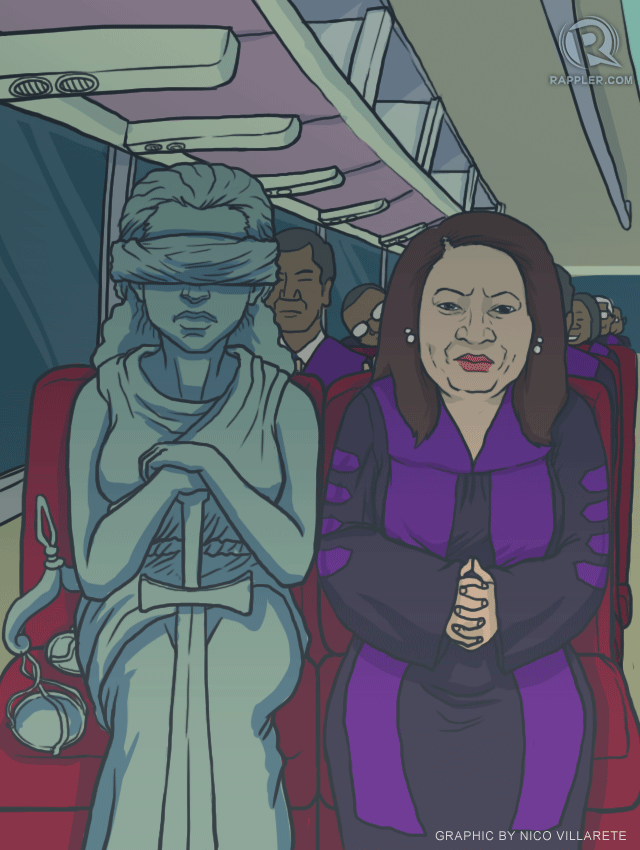SUMMARY
This is AI generated summarization, which may have errors. For context, always refer to the full article.

If there’s any lingering doubt that Malacañang and the Supreme Court are locked in a pitched battle, the appointment of former Solicitor General Francis Jardeleza puts that to rest. The President slapped his own appointee, Chief Justice Maria Lourdes Sereno, with this controversial choice and used the very institution she leads to prove her wrong.
Sereno had opposed Jardeleza’s nomination because of concerns that as solicitor general he made decisions that almost put in danger our case against China in an international tribunal. Invoking a special rule by the Judicial and Bar Council (JBC) which she heads, Sereno paved the way for the exclusion of Jardeleza from the short list of nominees for associate justice that the council submitted to the President. Incensed and likely with the backing of the President, Jardeleza went to the Supreme Court to ask the justices to put him back on the list and decide against their chief. Majority of them eventually did.
It was a triumph of presidential power, which Malacañang feels justified to do in the aftermath of what it considers was the court’s abuse of its own power when it ruled against the administration’s Disbursement Acceleration Program (DAP). The High Court voted unanimously in declaring parts of DAP unconstitutional. But it’s a unanimous vote that President Aquino and his advisers couldn’t quite accept. They saw in it a court gone out of control with a leader they suspect had been co-opted by power-playing justices.
Thus when the JBC excluded Jardeleza, Malacañang again saw the move as a direct affront to presidential power. How dare this chief justice limit the choices of the President, who has the sole power to appoint SC justices? Malacañang would not take this sitting down, and so it flexed all muscles to fight Sereno in her own court and defeat her. Never mind that the Jardeleza issue was used by the Arroyo appointees to the court to humiliate Sereno. Never mind that it was used by the Arroyo appointees to the court to send this message to the President: you made the wrong choice when you appointed her chief justice in 2012. Never mind that there were other equally capable nominees for the position. Never mind. The means through which this appointment was made is justified by Malacañang’s end goal: to teach Sereno a lesson or two on where to draw the line when it comes to messing with presidential power.
The current situation is a cause for concern.
After all, one of the key initiatives of the Aquino administration in 2010 was to reform the Philippine judiciary, which is saddled with problems of corruption, inefficiency, and scarce resources. As a first step, the President took the bold move of removing Renato Corona as chief justice in 2012. But as the succeeding years would show, Corona’s impeachment wasn’t the only fix that the court needed. Its major problems were the type that only time, sobriety, and wise decisions could address.
The weakest branch of government, the judiciary – it has no army and gets less than one percent of the total budget – will not be able to improve its processes without the support of the other branches: the executive and the legislative. But these branches now apparently consider the Supreme Court as their nemesis, the stumbling block to their agenda. Lawmakers regularly flash the impeachment card in an attempt to put justices in their place. Malacañang, despite its earlier promises, has not increased the meager budget of the judiciary. And the President doesn’t mind getting into a head-on collision with the Chief Justice over one Supreme Court nominee.
We dread a tit-for-tat scenario in the coming years until the President steps down in 2016. A lot is at stake. A litigious society goes to the Supreme Court for practically every legal relief they need on anything: contracts, agreements, policies, even elections.
If a government that initially helped cleanse the Supreme Court has apparently lost faith in it and seems prepared to do mortal combat with it, where are we headed? – Rappler.com
Add a comment
How does this make you feel?
There are no comments yet. Add your comment to start the conversation.